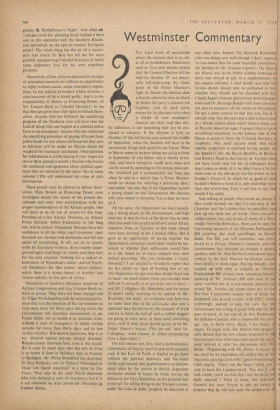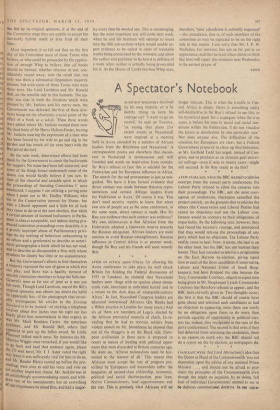Westminster Commentary
THE latest burst of speculation about the election date is as silly as all its predecessors. Statements such as 'It is now almost certain that the General Election will be held on October 29' are practi- cally self-disproving; the whole point of the Prime Minister's right to choose the election date is that he selects the time at which he thinks his party's chances are brightest (just as each party moves for by-election writs when it thinks its own candidate's chances are best), and that this, by definition, is not something that can be esti- mated in advance. If the election is held on October 29 this will be because around the middle of September, when the decision will have to be announced, things look good for the Tories. What in March seems to be how things are going to lOok in September (if you follow me) is wholly irrele- vant, and much newsprint could have been and can be saved by attending to this simple principle. Mr. Gaitskell put it economically not long ago when he said in a speech that 'a Prime Minister needs no excuse for selecting a particular date,' and added 'the idea that if the Opposition launch a strong attack on the Government the election will come sooner is nonsense.' Let us hear no more of it.
All the same. the Opposition has been launch- ing a strong attack on the Government, and high time too. It was the luck of the draw that so soon after last week's three-part serial on Central Africa, Question Time on Tuesday of this week should have been devoted to the Colonial Office. But it gave us an opportunity of seeing whether the Opposition's campaign could (and would) be sus- tained, or 'whether their enthusiasm would fade as it has faded on so many subjects that once looked promising. (Do you remember a Canal, Miranda?) 1 am pleased to be able to report that the fire shows no signs of burning low as yet. The Opposition has got two ideas firmly fixed into its head—no small matter when you consider how difficult it normally is to get even one in there— and Mr. Callaghan, Mr. Bottomley and the boyos (1 wasn't really meaning to be unkind to Mr. Brockway last week; my irritation with him was no more than that of the aficionado who sees a spectator leap the barrier at the moment of truth and try to finish the bull oft with a rubber (tagger) are going to work away at them until something gives, even it' what gives should prove to be Mr. Julian Amery's braces. ('We do not,' said Mr. Callaghan, 'need lessons in smear-campaigning from a Suez rebel.') The two themes are. first, that a parliamentary commission of inquiry must he sent to Nyasaland, even il the Earl of Perth is fearful to go there without his political bedsocks and hot-water bottle, and second, that parliamentary revelations about plots by the natives in British dependent territories should in future be made during the debate on the Navy Estimates, on the grounds that proposals for telling things to the Marines cannot, under the rules of order, properly be discussed at any other time. Indeed, Mr. Kenneth Robinson, who was doing very well (though I don't suppose !le was aware that his most beautiful constituent, the heroine of Mr. Truman Capote's The Muses are Heard, was in the Public Gallery listening to him), was moved to ask, in a supplementary to his request (refused. I need hardly say) that the Grivas diaries should now be published in full, whether they should not be classified with Dr. Cheddi Jagan's famous plot to burn down George- town and Dr. Hastings Banda's still more conveni- ent plot to massacre all the whites in Nyasaland. He got a dusty answer to that one, too, but ii is already clear that the next time a plot is discovered in a British colony (there hasn't been a cheep out of Pitcairn island for ages; I suspect they're hp to. something) somebody on the Labour side of the House is going to blow the Colonial Secretary a raspberry. Nor need anyone think that such healthy scepticism is confined to the people on the Speaker's left; the Baron Boothby of Buchan and Rattray Head in the County of Ayrshire may not have much time for his ex-colleagues these • days (come to think of it, he didn't have a lot for , them even in the old days), but his article in last Sunday's Dispatch, in which he as good as said he didn't believe a word of it, only said what more than one ermine-less Tory is not free to say, but would if he could.
And talking of people who would say things if they could reminds me that it is not only in the'i Chamber and the Lobbies that we pencillers care I pick up our daily tale of words. There are ,com- ; mittee-rooms, too, and in one of them, of a Wed- I nesday morning these days, there can be seen the fascinating spectacle of the Obscene Publications ; Bill crawling like snail unwillingly to Statute I .Book. The Bill, you will remember, was intro- duced as a Private Member's measure, and the 4 Government had intended to strangle it quietly z upstairs, until Sir Alan Herbert's threatened inter- i vention in the East Harrow by-election caused them hastily to think again. Having thought, they ; popped up with . what is virtually an Obscene Publications Bill of their own, consisting broadly' speaking of Mr. Jenkins's, Bill with most of the ( sense knocked out of it and heavier penalties in- serted. Mr. Jenkins, on whom . there are so few ( flies that 1 sometimes suspect him of being int, pregnated, like Kossek carpets, with DDT, rather! z surprisingly seemed to take the view that the ,! Government was acting in good. faith and the Bill t goes forward. Al the end of its first Wednesday the Solicitor-General, who is responsible for pilot- age, was in fairly sorry shape, I am happy it/ report. To begin with, Mr. Jenkins had categori- cally denied that the new clauses proposed by 1.1ip I Government were what had come out of the agree- ment arrived at after his discussions with Mr. t Butler. (Negotiating with Mr.. Butler. it OCC1.11' 10 ( me, must be an experience not unlike that of the N man who, playing cards w it h Captain Foulenotigh. a cried angrily. 'That's not the hand I dealt 'you!' only to have the Captain retort, 'No. and if yoti look closely you'll see that that's not the hand yoll a dealt yourself.') What is more, the Solicitor- c General has been forced to put on record 3 c promise that he will not resist the withdrawal of
the Bill by its original sponsors, if at the end of the Committee stage they are unable to accept the inevitably hybrid result as true fruit of their loins.
Most important, it so fell out that on the first day of the Committee most of those Tories who believe, or who could be persuaded by the applica- tion of enough Whip to believe, that all books should be banned, whether obscene or not, con- siderately stayed away, with the result that not, only was there a substantial Opposition majority present, but even some of those Tories who were there were, like Lord Lambton and Mr. Ronald Bell, on the sensible side in this business. The up- shot was that in both the divisions which were Pressed by Mr. Jenkins and his merry men, the Government was defeated, the first of these divi- sions being on the absolutely crucial point of the effect of a book as a whole. These three words Were added where Mr. Jenkins wanted them over the dead body of Sir Harry Hylton-Foster, leaving Mr. Jenkins wearing the expression of a man who has been forced by his wife to go and dig in the garden and has struck oil (or even beer) with the first jab of the fork.
By the next week, determined efforts had been made by the Government to comb the backwoods for support. No stone had been left unturned, and some of the things found underneath some of the stones you would hardly believe if you saw. In view of the cheerful and amiable spirit in which the proceedings of Standing Committee C were conducted, I suppose I am striking a jarring note When I point out to Mr. Dudley Williams, who sits in the Conservative interest for Exeter, but With a Liberal opponent and a little bit of luck may cease to do so at the next election, that while a certain amount of licensed buffoonery in Parlia- ment is always acceptable, and indeed during pro- tracted committee proceedings even desirable, it is a grossly improper abuse of Parliamentary privi- lege (to say nothing of behaviour unbecoming in an officer and a gentleman) to describe as notori- misly pornographic a book which he has not read, and to describe as disreputable a firm with whose Products he clearly has little or no acquaintance.
But the Government's efforts to find themselves a majority represent the sort of game at which two can play, and there was a healthy turnout of sensible committee-members to keep the Solicitor- General's nose as far out of joint as it was put last week. Though Lord Lambton, one of the Bill's Original sponsors, was absent (no doubt the habit he apparently has—if the photograph that invari- ably accompanies his articles in the Evening Standard is to be trusted—of sticking a telephone receiver about five inches into his right ear has finallY given him osteomalacia in that organ), as was Mr. Mark Bonham Carter, the notorious Publisher, and Mr. Ronald Bell, others had a_PPeared to pick up the fallen sword. Sir Leslie Plummer talked much sense, for instance (as Mr. iMaurice Wiggin once remarked, if you would like ° go back and read that sentence again, please (IQ;II wait here), Mr. J. J. Astor voted the right waY 'when it was sufficiently vital for him to do so, and Mr. Reader Harris turned up before the pro- ceedings were over to add his voice and vote on Yet another important clause. Mr. Jenkins. was in an astonishingly accommodating mood, and with- drew two of his amendments; but on everything of real importance he stood firm, and had a major-
ity every time he wanted one. This is encouraging, but the most important test will come next week, when he and his brethren will attempt to insert into the Bill sub-sections which would enable ex- pert evidence to be called in cases of reputable works being prosecuted by the wowsers, and allow the author and publisher to be heard in defence of a work when neither is actually being prosecuted for it. As the House of Lords two-line Whip says,
therefore, 'your attendance is earnestly requested' —the attendance, that is, of such members of the committee as may be expected to be on the right side in this matter. I am sorry that Mr. J. P. W. Mallalieu, for instance, has not so far put in an appearance, and that he (and others liable to think like him) will repair this omission next Wednesday is the earnest prayer of
TAPER



















































 Previous page
Previous page